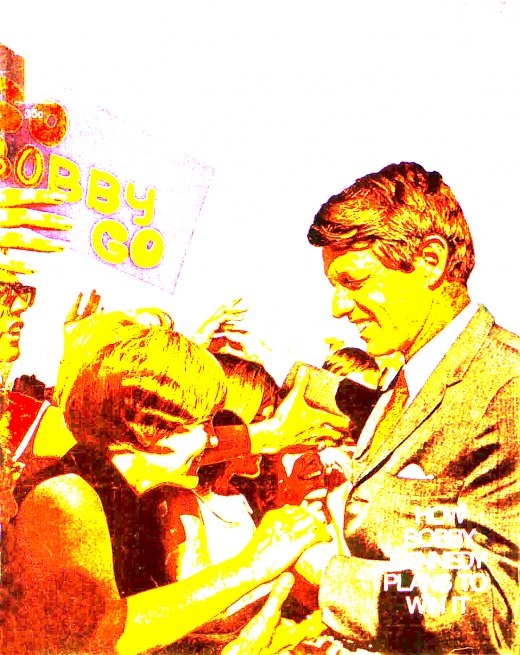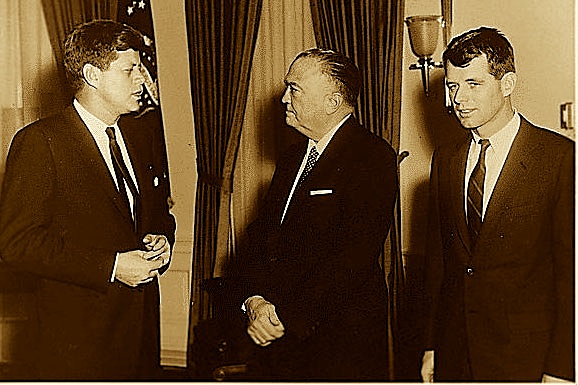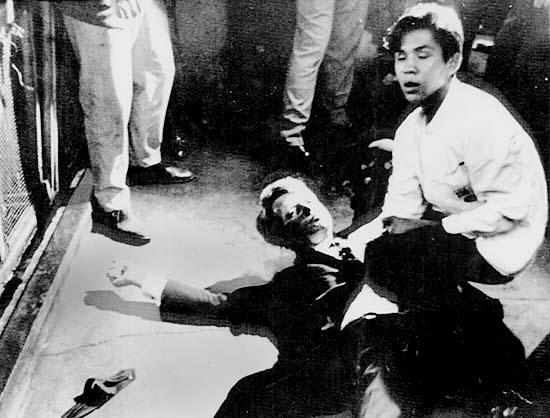
My brother need not be idealized, or enlarged in death beyond what he was in life; to be remembered simply as a good and decent man, who saw wrong and tried to right it, saw suffering and tried to heal it, saw war and tried to stop it. — Ted Kennedy, June 8th, 1968
A BRIEF HISTORY OF AMAZING LETDOWNS:
U.S. Counsel (1953-1960)
Robert Kennedy joins the Senate Subcommittee on Investigations in 1953 under the tutelage of Sen. Joseph McCarthy. He eventually resigns from the committee over disagreements with Senator McCarthy’s anti-communist campaign against federal officials. Once McCarthy is deposed from office in 1954, Kennedy rejoins the committee as chief counsel and director. He goes on to lead aggressive campaigns against union corruption and organized crime, and successfully prosecutes famed union leader James R. “Jimmy” Hoffa.
The Kennedy Campaign (1960)
Robert Kennedy leaves the Senate subcommittee to manage his brother John Fitzgerald Kennedy’s successful bid for the presidency.
 Attorney General (1961-1964)
Attorney General (1961-1964)
President John Kennedy appoints Robert as attorney general, where he continues to focus on combating organized crime and racial discrimination. He becomes his brother’s most trusted adviser on legislative issues ranging from civil rights to the Cuban Missile Crisis. His older brother’s assassination in 1963 devastates him, and he remains in office only briefly thereafter.
Senator, New York (1964-1968)
Following a widening rift with John F. Kennedy’s successor, Lyndon Johnson, Kennedy resigns from the federal cabinet in 1964. He pursues and wins the Senate seat from New York. By 1966, he becomes a vocal critic of President Johnson’s domestic programs and the ongoing war in Vietnam.
The Last Campaign (1968)
After a period of speculation and doubt, Robert Kennedy launches his campaign for the presidency in March 1968. Drawing on an anti-war message and calling for racial reconciliation, Kennedy leads a whirlwind campaign across the country. He defeats opponent Eugene McCarthy in the Indiana and Nebraska primaries, but loses the Oregon primary in May.
June 5, 1968
After midnight, shortly after winning the South Dakota and California primaries and announcing ” … now it’s on to Chicago,” Kennedy is shot in the Ambassador Hotel by Sirhan Sirhan, a Jordanian immigrant. He dies the following day in Los Angeles. Robert Kennedy is buried in Arlington National Cemetery in Arlington, Va. [via NPR]
Journalist Pete Hamill was friends with Robert F. Kennedy, helped persuade him to run for president, worked briefly for the campaign and then wrote about it. And he was with Kennedy when the candidate was assassinated by a gunman at Los Angeles’ Ambassador Hotel. Kennedy died 40 years ago today; it was his murder that prompted the Secret Service to offer protection to presidential candidates. Pete Hamill has written an essay for the book A Time It Was: Bobby Kennedy in the Sixties, a collection of photographs by Bill Eppridge, who followed Kennedy’s campaign and was also there the night Kennedy was killed.
THE BEATLES: A Day In The Life
*
356: The Prosecutor
A lawyer in the Justice Department gets the professional opportunity of a lifetime: to be the lead prosecutor in one of the first high-profile terrorist cases since 9/11. But things go badly for him. His convictions get overturned, he loses his job, and he ends up on trial himself, in federal court. His accusers? His former colleagues at the Justice department. Host Ira Glass recalls the case of the so-called Detroit Sleeper Cell—four men, arrested in the weeks after 9/11, accused of plotting terrorist attacks. Ira explains that the entire program will be devoted to the story of the man who prosecuted the case…an up-and-coming prosecutor in the Department of Justice, Richard G. Convertino. Reporter Petra Bartosiewicz tells the first half of Rick Convertino’s story. The Detroit Sleeper case was one of the earliest Justice Department victories in the war on terror. But that victory was overturned, and you could argue that the thing that overturned it was that most banal yet powerful of forces: office politics. Tensions between Rick and his bosses at the Justice Department escalate: they demote him, he sues them, they put him on trial for criminal misconduct, in the very same federal court house where we won the Sleeper Cell case. Petra is writing a book on this and other Justice Department cases in the war on terror called The Best Terrorists We Could Find. It’s due out in the spring of 2009.

